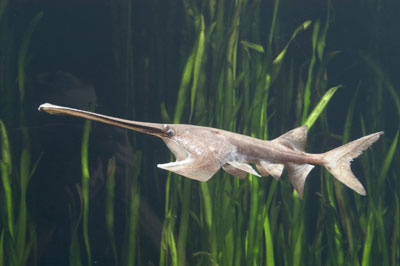|
back Home Life Along a
|
|
Paddlefish
Polyodon spathula|
© Tom Stailey, Tennessee Aquarium |
Paddlefish are the oldest surviving animal species in North America. Fossil records indicate that it is older than dinosaurs (300 million years). The species is distinguished by their large mouths and a long paddle-shaped nose, or rostrum, which is about 1/3 their entire length. That is a pretty long nose considering the fish can reach a length of 1.5 m and weigh about 27 kg on average. This makes them one of the largest fresh water fish in North America. The large rostrum has given them the nickname of the spoonbill. It was originally thought that they used their rostrum to dig up food from the bottom of a river, but we now know they eat zooplankton by swimming with their mouths open and filtering the organisms with tiny structures called gill rakers. Their rostrum has sensitive electroreceptors on its paddle which is believed to help the fish to find their prey. Like sharks, paddlefish have skeletons made entirely of cartilage, not bone. Also, paddlefish have no scales. To reproduce, females release many sticky eggs that attach to gravel and rocks. Several different males will swim by and fertilize the deposited eggs. Both male and female paddlefish must be several years old before reproducing. Hatchlings are self-sufficient and receive no parental care. By the end of the first year, paddlefish can reach 25 cm in length. Biologists believe paddlefish can live more than 50 years. Living in large, deep, slow moving rivers, paddlefish are now found only in the Mississippi drainage system. Primary threats to the species include impoundments and habitat modification. |
|
back to species list |
PDF of all species profiles
|

